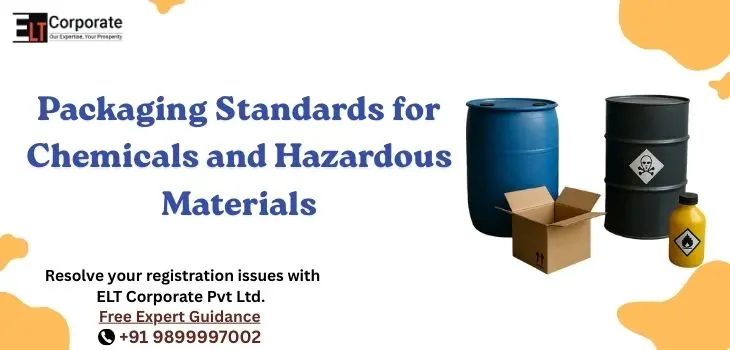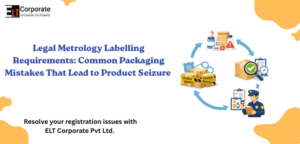The Packaging Standards chemical industry deals with products like acids, solvents, fertilizers, pesticides, paints, and industrial chemicals, which are sold in packaged form and traded in large volumes. To protect buyers and ensure fair trade, the Legal Metrology Act, 2009 applies strict rules for weights, measures, and packaging. Following Legal Metrology in the Chemical Industry ensures that businesses use the right measurements, show correct labeling details, and comply with government safety standards. This avoids penalties and builds trust with customers.
What is Legal Metrology in the Packaging Standards Chemical Industry?
Legal Metrology in the Chemical Industry means applying laws and standards related to weights, measures, and packaging of chemical products. It ensures that:
- Packaged chemicals show correct weight, volume, and quantity.
- Labels display all mandatory details like MRP, batch number, and expiry.
- Measuring instruments (like weighing machines, tanks, and flow meters) are verified and stamped.
- Fair trade and consumer safety are maintained.
Why is Legal Metrology in the Chemical Industry important?
It is important because chemicals are high-risk products, and even small errors in quantity or labeling can cause:
- Safety hazards for users.
- Financial loss for buyers.
- Legal penalties for manufacturers.
Importance includes:
- Protecting consumers from wrong quantity or misbranding.
- Ensuring transparency in trade.
- Supporting compliance with environmental and safety rules.
- Building brand reputation through trust.
Which authority regulates Legal Metrology in the Chemical Industry?
The main authority is the Department of Consumer Affairs (Legal Metrology Division) under the Government of India. Other authorities also play roles:
- State Legal Metrology Departments – enforce rules at local level.
- Bureau of Indian Standards (BIS) – for chemical product quality.
- FSSAI (if applicable) – for chemicals used in food-grade applications.
What are the mandatory labeling requirements under Legal Metrology in the Chemical Industry?
Every packaged chemical product must have:
- Name and address of the manufacturer /importer.
- Common or chemical name of the product.
- Net weight, volume, or quantity.
- Batch number and date of manufacture.
- Expiry date (if applicable).
- Maximum Retail Price (MRP).
- Customer care details.
- Country of origin (for imports).
Without these details, the product may be seized by authorities.
What documents are required for Legal Metrology compliance in the Chemical Industry?
Businesses in the chemical industry usually need to prepare the following documents:
- Application for LMPC certificate.
- Company incorporation documents.
- GST registration.
- Import Export Code (for importers).
- Product details with packaging size and labels.
- Authorization letter (if applying through a consultant/agent).
What licenses are required for Legal Metrology in the Chemical Industry?
To comply, chemical companies need:
- Packaged Commodity Registration (LMPC Certificate) – for importers and manufacturers.
- Dealer / Manufacturer / Repairer license – if they deal with weighing or measuring instruments.
- Model Approval – for measuring instruments like tanks or flow meters used in the chemical trade.
What are the Penalties for Not Following Legal Metrology in the Chemical Industry?
Non-compliance with Legal Metrology in the chemical industry can result in:
- Monetary fines ranging from ₹2,000 to ₹50,000 or more depending on the violation.
- Seizure of chemical products.
- Cancellation of licenses/registrations.
- In serious cases, imprisonment under the Legal Metrology Act, 2009..
What challenges do companies face in Legal Metrology in the Chemical Industry?
Some common challenges are:
- Frequent changes in rules.
- Confusion between Legal Metrology and other laws like BIS, Environment laws.
- Incorrect packaging or wrong quantity declaration.
- Lack of awareness among small chemical traders.
How can businesses ensure compliance with Legal Metrology in the Chemical Industry?
To stay compliant, businesses should:
- Register with the Legal Metrology Department.
- Ensure all packaged chemicals carry mandatory label declarations.
- Use only approved weighing and measuring instruments.
- Conduct regular internal audits.
- Take help from professional Legal Metrology consultant for smooth compliance.
What are the benefits of Legal Metrology in the Chemical Industry?
Some key benefits are:
- Fair trade practices.
- Consumer protection.
- International acceptance of chemical exports.
- Reduced chances of disputes between buyers and sellers.
- Increased trust in Indian chemical products.
What happens if a chemical company sells products without Legal Metrology compliance?
They may face fines, seizure of goods, or even imprisonment under the Legal Metrology Act, 2009.
Does Legal Metrology apply to both bulk and packaged chemicals?
Yes, Legal Metrology in the chemical industry applies to both bulk trade and packaged commodities where weight and labeling are important.








